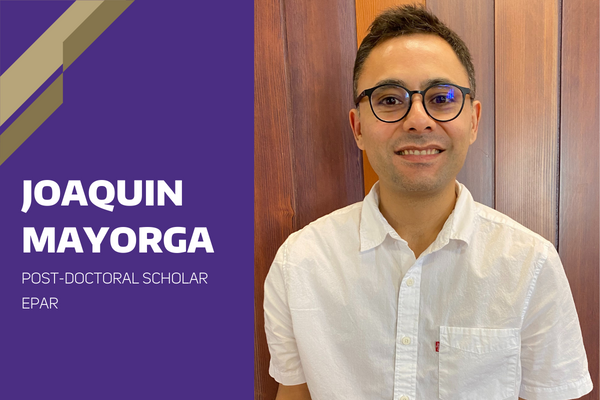Joaquin Mayorga recently joined the Evans School of Public Policy & Governance as a postdoctoral scholar with the Evans School Policy Analysis and Research Group (EPAR). He received his Ph.D. in Business Administration with a concentration in Agribusiness from the WP Carey School of Business at Arizona State University and an MA in Economics from the Center for Economic Research and Teaching (Mexico City). Before his graduate studies, he worked as a Junior Researcher at the Center for Environmental-Economic Modeling and Analysis at INESAD in La Paz, Bolivia.
The Evans School spent time with Joaquin to learn more about his research program and interests.
Evans: Welcome to the Evans School! You have extensive expertise around the effects of climate hazards on agricultural productivity and small-scale producers’ livelihoods. How did you first become interested in this area of policy research?
JM: Thank you for the welcome! My interest in this area comes from my experience growing up in Bolivia, where about a third of the labor force works in agriculture. I saw firsthand the impact of droughts and receding mountain glaciers on the water supply for cities and small-scale producers in my region. After my undergraduate studies, I worked on data-driven and policy-oriented projects related to forest conservation and agricultural productivity. This experience further motivated me to pursue graduate studies in agricultural economics.
Evans: If you reflect on your research portfolio to date, what are a couple findings that stand out to you as particularly important for policymakers to understand?
JM: I think two findings stand out in my research portfolio. One result shows that small-scale producers in Nigeria tend to increase the area planted in adaptation to high-temperature shocks. This adaptation may mitigate income shocks in the short term but may not be sustainable in the long run if it reduces soil quality. The other finding indicates that supply chain contracts between small-scale producers and intermediary firms with a fixed output price and training provision raise farm productivity, particularly for more risk-averse farmers. These findings show the need for policymakers to consider the long-term implications of climate adaptation practices and the advantages of promoting supply chain contracts between small-scale producers and intermediary firms.
Evans: Your work leads you to studying agricultural production across the globe. How does working in many different social and cultural settings strengthen your approach to understanding the relationship between climate change and agricultural policy?
JM: In my experience, small-scale producers worldwide face some common climate-related challenges, but the responses and adaptations can vary across countries. Understanding the drivers of these variations is critical in identifying effective policy solutions for climate change challenges. Working across different regions has deepened my appreciation for the importance of context-specific policies to support agricultural producers.
Evans: You draw upon many different sources of data in your work. What are the common challenges you encounter around data quality in this area of research? Where are data quality investments most needed?
JM: I sometimes encounter challenges with measurement error, especially when variables like plot size are self-reported by farmers. Also, data availability varies by location, as some low- and middle-income countries have high-quality small-scale producer surveys while others have little to no farm-level data. Given the need to address climate change, I believe it would be helpful to include questions about farmers’ perceptions of climate change in farmer surveys. This addition could provide policymakers with valuable insights.
Evans: What excites you most about this post-doctoral research position with EPAR?
JM: What excites me the most about this position is the chance to work on policy-oriented analysis and research in collaboration with stakeholders in the policy-making process. I’m also thrilled to work with a great team of researchers and be part of the broader community at the Evans School and UW. I am looking forward to producing research with real-world impact.
Evans: Thanks for chatting – welcome again to the Evans School!
JM: Thank you!
